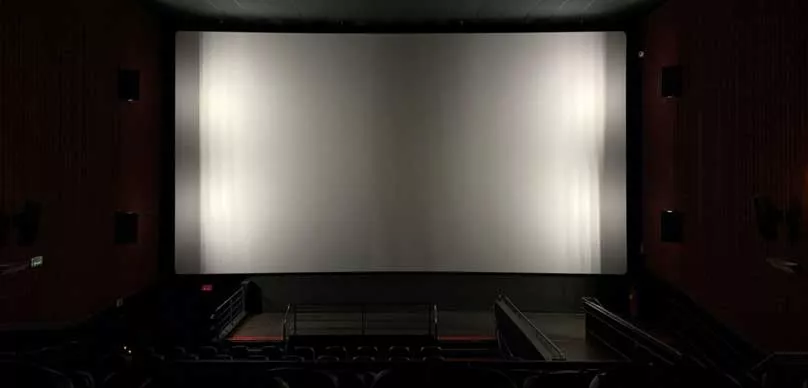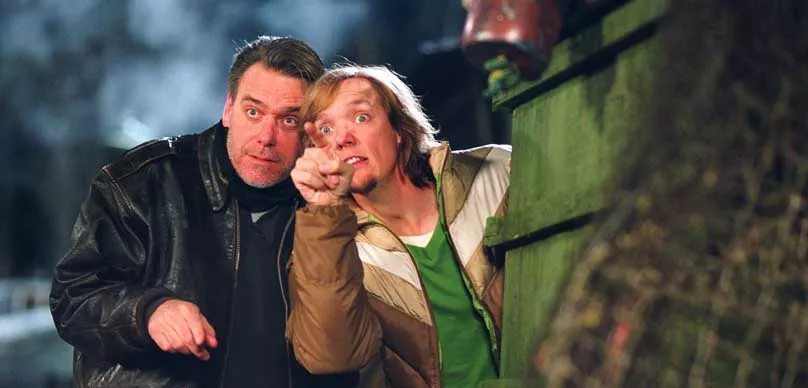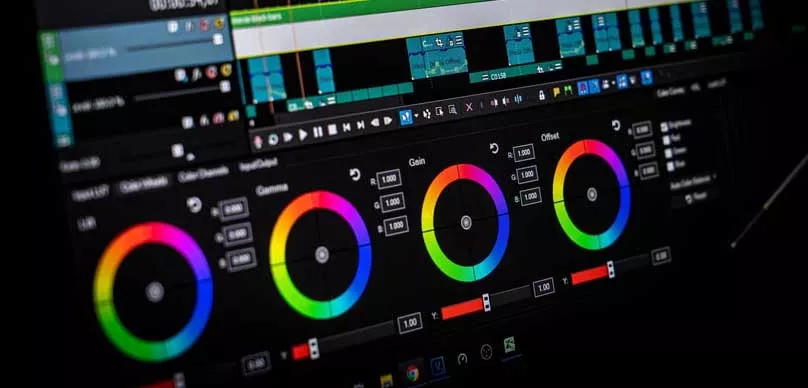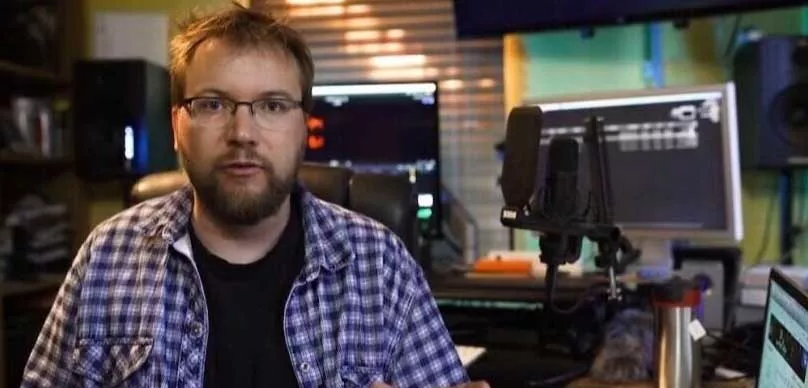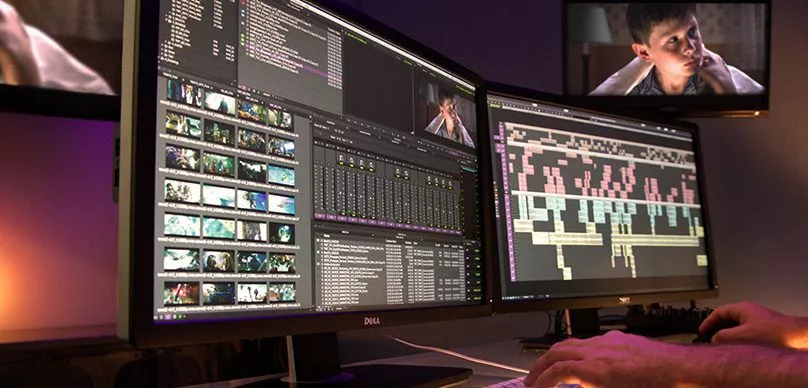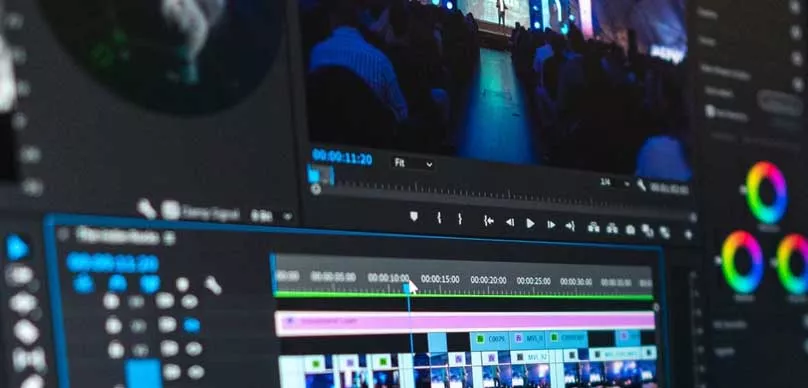I know I’m being a bit dramatic when I say…
“Understand Post Production Workflow or DIE!”
…but I’ve seen and been involved with sooooooo many independent films that just die in post-production because of one simple thing, they didn’t understand post-production workflow.
Post Production Workflow is not a black art that only a few understand, granted it is getting more and more complicated these days but you as an indie filmmaker can still understand the basics.
Post Production Nightmare
Example: If you have a RED Dragon your director of photography can bring to the party when you’re shooting your film great! Now what you need to ask yourself is what that “FREE” RED Dragon is going to cost you in post-production.
If you had a plan of editing your film on your laptop forget about it. The post-production workflow for the RED Dragon 6K is a beast and you would not be able to edit at home. You would then need to hire an editor who can handle that workflow and understands where his work is going to next, color grading.
This is fine if you budgeted for an editor but if you have no more money and you have all this amazing footage sitting on hard drives then you are screwed. I’ve worked on films with major movie stars in it that fell into this trap.
I’m not even going to bring up visual effects, that’s another conversation entirely. Take a listen to this episode. I hope it shines a light on this dark little corner of independent film that is understanding your post-production workflow.
Right-click here to download the MP3
Alex Ferrari 0:00
Welcome, guys to another great show. Today we have a topic that I'm going to be talking about that is very near and dear to my heart. But before we get into it, make sure you can head on over to free film book calm, that's free film book calm, and get your free audio book immediately. So one thing I wanted to talk about, and it's something I seen so much time, I mean, I've, I've delivered over 100 different independent film projects over the years, not including over 1000, including all the commercials, promotions, music, videos, and other things I've done. One thing I've seen common common problem with not only all of those, but specifically with independent film, in the technical aspect of it is post production workflow. A lot of independent filmmakers who are not technically inclined trust, a lot of times the people around them to just take care of all this stuff for them. And it is hard I've seen so many filmmakers fail miserably to the point where their movies look horrible, can't get finished. They can't get distribution, they can't get it sold, because it didn't figure out workflow. So let me explain to you what post production workflow is, is understanding the workflow all the way from production to final deliverable, and I'll go over over that with you in a second. So basically, when you're on set, you're, you're going to shoot on a camera, okay, based on that camera, you see, the old workflow is much easier with film. So film was film, and the workflow is the same for 90 years, almost 100 years, that workflow never really changed, for the most part. But now, there's new cameras, new formats, new, you know, aspect ratios, everything's changing daily. So workflow is more important now than it ever has been before. So let's say you're going to, you're going to shoot a movie that is a $50,000 movie, first, let's say for an instance, and you've got a dp who has a brand new Red Dragon 6k, and he's like, we're gonna shoot this 6k. And I've got these, these lenses I'm going to be using and all this great stuff. But we're going to shoot since Kay, we don't have a lot of light. So don't worry about the light, because the dragon will pick up everything. Well, Mistake number one, a dragon will not pick up everything, you still need light. But back to workflow, I don't want to get into to my colors, I want to take my colors hat off and put my post production supervisor hat on. So let's say you have that red dragon, and you shoot the whole movie on Red Dragon. Now, unfortunately, you don't have money for post. So you were going to edit this on your laptop at home with premiere or Final Cut or you know any other editing software. But let's say you're going to do it with premiere, which could handle 6k natively. But unfortunately, you're doing this on a laptop and your drives aren't fast enough. So you can't really edit it, you can't even watch it, you can't even do anything with it. So you got this beautiful, or at least has a huge amount of footage on a format that you really can do anything with. So now where you thought you didn't have any money, that you weren't going to spend any money, you're not going to spend money, because now you got to go hire an editor who can handle this workflow. Who can handle that the workflow but can handle these files. Now, that's step one. Now let's say you find an editor that runs premiere natively, you're great. If not, you might have to find a guy who's cutting on Final Cut seven. And he's going to transcode everything which will take you depending on the kind of system he has could take you weeks of transcoding just to get it into a format that he can edit. And then once he's done editing it, let's say you lock that cut out I'm not even talking about visual effects. I'm not even talking about speech changes, ramps, re composition, I'm not talking about any of that I'm just talking the basic stuff. All those other things I just talked about are bigger headaches, that will create more and more problems in your workflow. So I'm just going to take you through the basics and then we'll go back and talk a little bit about the other stuff. So then you're gonna go, you're gonna have this guy, edit your movie, Alright, so let's say he he's able to edit natively, let's say best case scenario. Well, once she's done editing this, and this one workflow, we're gonna say native, native, meaning that he's just taking the raw files and editing those raw files. Once he's done doing that, Then he has to, once he's done editing and let's say you've blocked the picture. Well, now you've got to send all your red files and all your, your EDL edit decision list, to a colorist to color this because red without color grading is, it's garbage, you have to call a grade, all your movies have to be color graded, or else you're never going to be able to sell it, it has to have some sort of professional look to it. So now you send it over to a colorist who has to hopefully be able to understand red, Ed, premiere EDL and then also handle red. So a system that's strong enough and big enough to handle red. So let's say you go to a da Vinci system, which is kind of industry standard now. But let's say you go to a guy who has color for God's sakes or is trying to color grade this in Adobe, or color grading this and Final Cut x or, or baselight or scratch or a million other different colors, they all have a color system, they all have to be able to talk to each other whatever the color system is, I use the Vinci it is the industry standard for for especially for indie film, but you have to have a system that can be able to handle 6k files. And that's if you shot everything at 6k, let me go back for a second, you might have shot some stuff Slo Mo, and if you shot some stuff Slo Mo, guess what, it's not 6k anymore is gonna drop down to 543 and twos K, depending on how fast you go. So now you have to take that into consideration. So let's take that into color grading. So now we call it grades, the whole thing. And again, I'm doing this the best case scenario, I'll throw some worst case scenarios at you in a minute. So he colors, the grades, the whole thing, but he has to make sure you have to make sure our system can handle it. He has a calibrated monitor to that. So you actually see the color that you're seeing is an actual correct representation of the color. Once he's done with it, then he has to render it out. And now you have to figure out where you're going with this. So if you're going to a digital format, you know, there's a lot of talk about 4k right now. And I know in the future, this is going to sound old fashioned, but for right now at the moment that we're in 2015. 4k is still a bit of a pig to to master to it's doable. I mastered to 4k all the time now. But I also have a juiced up system that can handle that more unlikely to K is going to be more than fine for you and more than likely 1080 P is going to be more than fine with you for you. Depending on your movie, depending on what you're trying to do. If you can master at 4k for future proofing your ears, your your project 2k is industry standard right now. And most people master at 2k, you'll be fine. And many movies I've mastered are at 10 ATP. Actually most I would say 95% of all the movies I've ever mastered or worked on master attended EP because I was a standard as well. So so once he renders it out, you have to render it out to a quick time and who's going to online this for you now the online process is once he all those files, go back to an editor who puts it all together for you, you have to put together the audio, you have to put together any graphics. And I'll get to visual effects in a second. But let's say you have visual effects shots coming in, those have to be placed on and all these kind of problems happen. You have to make sure that new system that's gonna be able to handle whatever he outputs, which could be dp X Files, which could be QuickTime files, which could be a bunch of different type of formats. I'm not trying to scare you here. But I'm I'm trying to impress upon you how complicated this process can be, especially when you're dealing at the upper echelon of files. So we started off with a red camera, this conversation is completely different. If we're starting off with a five D, a black magic book, the concepts are all still there, you still have to be able to handle these file formats, and be able to have the hard drive space, be able to have a clean workflow. Preferably you'd hire someone like myself, or at least consult someone like me. You know, I'm telling you, if you hire someone like me for an hour conversation, and you pay their hourly rate, whoever that might be a post production supervisor or something, and they can just draft out a workflow for you Oh, my God, that will save you so much time and you do this before you ever shoot. If you have a budget and you have a little more money, you hire them for the shoot, and they can kind of supervise this entire process. It's so important, especially with the plethora of formats that you were dealing with today. It's absolutely nuts and I every day I'm getting new like oh this is new file format. Oh this is a new file format, which is one of the reasons why I love the Vinci so much because Da Vinci reads everything and works with everybody. The Vinci is one of the best color systems and online systems out there right now for the bank for the best bang for the buck without question. So anyway, so you go back, you get back to your online system situation. You got your online everything and then you output now you can output to a DCP you can output to a pro res file, you can output to dp X Files which will go to a DCP. And then the quick to this so many different options. So going back let's say you're shooting on a Blackmagic. You know I have a Blackmagic Cinema Camera, and you shoot pro res. Well, that makes life so much easier. And that might be perfect for what you're trying to do. You should on pro res 442 to HQ, it take it into any editing system almost that's worth its weight is going to be able to handle progress. you edit it all, there's no big files to deal with, you can do that on your laptop, no problem at all. And that might just be what you can afford. Regardless if you're shooting it regardless, if you have a frickin Alexa, or a you know, shooting or read shooting 6k Ra, you might not be able to handle that. And it might take you two years to finish your movie. Or you can shoot pro res tree, you know, shoot with a smaller camera that still looks gorgeous. Get your kind of movie that your movie done, edit it yourself, you have complete control of it, send it over to a colorist, any colors is going to be able to handle progress. Without question, they color it, they send it back to you. But when you're shooting pro res, you have to make sure you have an amazing dp who really understands lighting and things like that. Because if you start bringing down your formats, or your kind of file format or your camera, the lighting has to be much better, I can save a lot as a colorist, I can save a lot in a red file, because the red file does have a lot of information in it or in a raw file from Blackmagic or a raw file from Alexa or Sony or things like that. But when you start getting into more of those compressed files, like a pro res file, or God forbid, a five D you know mp4, which is the lowest quality you can shoot with. If you're trying to do something else, you better have a really great dp to be able to make that image look good. If not, you're done, like you've wasted your time. So I wanted and I'm very passionate about this because I've seen so many movies die in post I've been I've been brought in to save many, many movies purely because they did not understand workflow. It was it was such an important part of the post production process. Without workflow you've got nothing. And I didn't even touch upon audio workflow making sure that when you lock your cut, that Final Cut has to stay locked, that information sends to the colorist and you also send that to the your sound people to be able to match everything perfectly. If one frame goes off, everything goes out of whack. I mean I can go on and on and on, there's so much information to be doing. So if you have a low budget movie, use a camera that gives you a beautiful image of Blackmagic cameras perfect because I'm not a big fan of the five DS and 70 cameras because you really need to have a really good lighting scenario or shoot a lot of stuff outside. But even then you've got to protect yourself from you know blown highlights and things like that. So the the range that the Blackmagic camera gives you is a lot better than the five D or seven D and it's approximately the same price point. And the workflow is a lot easier as well. So you get a big fat or file and so on. So I like the Blackmagic it's all preference but on a technical standpoint, an mp4 file is so so low on the totem pole versus a pro res file which then goes into the higher rez higher risk formats like a dp x, XLR or, or the raw files. So I would use I would use a black magic if you're going to do a low budget movie or, or something equivalent, you know even if you shoot Alexa Alexa has pro rats, you know you can shoot 2k a 4k Pro res files, if that's the workflow, you can handle crate the new reds are being able to shoot pro res files as well. So you might be able to just if your workflow can't handle read transcode everything from red to pro res and work with it I would suggest against it. That's what the reason you're shooting with red, but so on and so forth. I'm kind of babbling a little bit here. I'm sorry. But basic, basic takeaway from this episode is workflow, understand your workflow, get people who understand workflow clearly, to give you a guide on how to finish your movie, because if not, it will sit and die in post and I've seen it happen multiple multiple times. So hire someone like me to just consult with you, if you can't afford you know 150 bucks to 300 bucks out of your budget to talk to a post production supervisor to kind of you know just kind of get have them give you a basic workflow is probably one of the best investments you'll make in your filmmaking process while making a feature film. So if you have any questions at all about post guys, hit me up on On the website, I do offer when to do self promote, I do offer consulting as far as post production workflow as well as just a consulting you know over a phone call or I can actually build out an entire workflow for you. But I'm not trying to do a hard sell honestly guys, if you can't, you know, if you if you don't use me, you somebody, I don't care. Just use somebody that can help you with that there's plenty of amazing post production supervisors out there who will be more than willing to talk to you for you know, an hour on the phone or two hours on the phone or meet you for coffee, and you pay them for their time and the work the workflow out for you and if you can afford to hire them, it is so beneficial to your process. So sure, you can always just head on over to indie film, hustle, calm and at the very top of the bar it says do a one on one coaching, just click on that. Or you can head over to indie film, hustle, calm Ford slash consulting. And that'll give you all the information you need about what I offer filmmakers. But I'm real passionate about this guys, because I really want to see your movies get made, no matter what your budget level is. If it's 10,000 bucks, or if it's a million dollar budget or above, you really need to have someone like me, help you with the post production workflow. So thanks again guys for tuning in. And I will see you on the next podcast.
Sign up to receive email updates
Enter your name and email address below and I'll send you periodic updates about the podcast.
YOUTUBE VIDEO
LINKS
- Post Prod. Consulting
- Custom Post Prod. Workflow for Your Independent Film
- Numb Robot Studios – Post Production & VFX Services
- Blackmagic Design DaVinci Resolve Software for Mac/Win/Linux
- Adobe Premiere Pro CC
- Final Cut Pro X
SPONSORS
- Bulletproof Script Coverage – Get Your Screenplay Read by Hollywood Professionals
- Audible – Get a Free Filmmaking or Screenwriting Audiobook
- Rev.com – $1.25 Closed Captions for Indie Filmmakers – Rev ($10 Off Your First Order)














